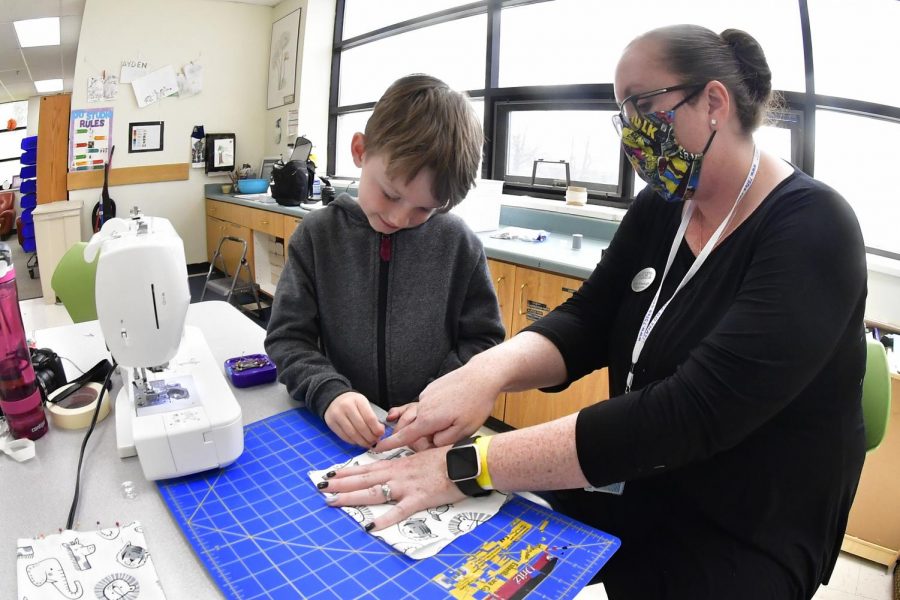What to Know About Face Masks in Preventing the Spread of COVID-19
Todd Cromar on Wikimedia Commons
Making your own cloth mask is a resourceful and effective alternative to using the even more effective surgical and N95 masks, which are short in supply. The CDC requests that surgical masks and N96 masks be reserved for healthcare workers. Creative Commons photo: Todd Cromar on Wikimedia Commons.
May 25, 2020
Since early April, the Centers for Disease Control and Prevention (CDC) has been recommending that all Americans wear cloth masks in public, saving the more effective surgical and N95 masks that are in short supply for medical workers. There’s a lot that’s still unknown about the effectiveness of each kind of mask in preventing the spread of COVID-19, but as of right now, evidence suggests that all types of face masks, if worn properly, do help to some degree. It is also important to realize that face masks are far from perfect but should not be seen as a “first line of defense,” according to Medical News Today. It is still absolutely essential to continue washing your hands, to avoid touching your face, to maintain social distancing whenever possible and to take other preventative measures. Here’s what you should know about each kind of mask.
Cloth Masks:
According to Dr. William Schaffner, medical director for the National Foundation for Infectious Diseases, there is not much evidence suggesting that cloth masks are effective in preventing virus particles from reaching the mask wearer. They are effective, however, in limiting the distance virus particles can travel if a person coughs or sneezes while wearing one. According to NPR, “If you cough or sneeze, the mask can catch those respiratory droplets so they don’t land on other people or surfaces.”.
It is important to wear a cloth mask even if you feel healthy though. Studies have shown that those infected with the novel coronavirus can spread the virus for up to 48 hours before they experience symptoms. In addition, CDC Director Dr. Robert Redfield estimated that up to 25% of people infected with COVID-19 never experience symptoms and may still be involved in spreading the virus.
To ensure that cloth masks are being used as effectively as possible, it is important to wash or discard the mask, preferably with soap and hot water in a washing machine after each use. It is fine for masks to be washed with other clothing or linens.
In addition, remove a cloth mask by the straps, rather than touching the front, and wash your hands afterward. This ensures that virus particles that might be on the outside of the mask don’t get on your hands and face.
There is also a difference between cloth face masks that fit closely to your face and using a bandana or scarf. “You can imagine if you put a loosely knit scarf with lots of holes in it … that would not be very effective,” Dr. Michael Klompas, an infectious disease physician at Brigham and Women’s Hospital, said to NPR. Similarly, according to The New York Times, bandanas should only be used as a last resort, and it is preferable to double or triple that kind of fabric if possible.
For information about how to make your own mask, check out this tutorial on the CDC’s website.
Surgical Masks:
Surgical masks are more loosely fitting, disposable masks that doctors primarily use for surgery. They help to block droplets and other substances that may contain germs from reaching the wearer. A recent study published in Nature Medicine, conducted by researchers at the University of Maryland and the University of Hong Kong, suggests that surgical masks are effective in reducing the spread of virus particles from an infected person. They also may be more effective than cloth masks in blocking particles like water droplets containing the virus from reaching the wearer, which is in part why the CDC is still requesting that these masks be reserved for healthcare workers.
N95 Masks:
N95 masks are the most effective in both blocking coronavirus particles from the wearer and preventing the wearer from spreading the virus, as long as they don’t have a one-way vent that releases unfiltered particles into the air in order to make it easier for the wearer to breathe. According to the CDC, N95 masks block 95% of particles in the air, including bacteria and viruses. To ensure these masks work as well as possible, it is important that they are fitted correctly and create a tight seal around the face.
Since there is currently a shortage of these masks, the CDC does not recommend purchasing or wearing one so that they can instead go to healthcare workers. To address the shortage, the U.S. Department of Defense recently awarded 3M, a technology company, $126 million to increase their N95 mask production by at least 312 million annually. In addition, companies including Honeywell and Owens Minor have also received millions of dollars from the Department of Defense to boost N95 production. While these steps certainly help, it likely will not be enough to completely stop the shortage soon, according to an April 6 Wired article.


